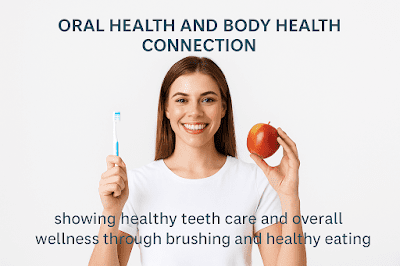Have you ever stopped to think about how closely your oral health and body health are connected? For years, I treated dental care as something separate from my overall wellness routine—just brush, floss, and maybe visit the dentist twice a year.
But over time, I realized that what happens in the mouth doesn’t stay in the mouth. Poor oral hygiene can contribute to heart disease, diabetes, and even digestive issues. On the other hand, simple daily habits like brushing, flossing, and practicing holistic dental care can strengthen both your teeth and your body.
In this article, we’ll break down the science behind the connection between oral health and body health, explore how conditions like gum disease and heart health are linked, and share practical dental hygiene tips that go beyond the basics. By the end, you’ll see why the importance of brushing and flossing daily cannot be overstated, and how caring for your smile is really about caring for your whole body.
Oral Health and Overall Body Health Connection
The connection between oral health and body health is stronger than most people think. The mouth is home to millions of bacteria, some good and some harmful. If oral hygiene is neglected, harmful bacteria can multiply and enter the bloodstream, leading to inflammation and infections in other parts of the body. This is why poor dental care is often linked to health conditions like diabetes, respiratory infections, and even stroke.
Think of your mouth as the “entry point” to your overall wellness. For example, bleeding gums aren’t just a dental issue—they may signal a weakened immune response or systemic inflammation. On the other hand, consistent oral hygiene strengthens your immune system and supports your body’s natural defenses.
Ways oral health impacts body health include:
- Weakened immunity: Oral infections force the body to fight constant inflammation, lowering resistance to other diseases.
- Respiratory issues: Bacteria in the mouth can travel to the lungs, contributing to infections such as pneumonia.
- Digestive problems: Poor oral health affects chewing and saliva production, both essential for proper digestion.
This shows that maintaining your mouth isn’t just about avoiding cavities—it’s about protecting your whole body. If you’re interested in other ways your daily habits affect overall wellness, check out our guide on Tips to Improve Gut Health for a deeper look at how body systems are interconnected.
Gum Disease and Heart Health
One of the most researched connections in medicine is between gum disease and heart health. Gum disease, or periodontal disease, starts with plaque buildup that irritates the gums, leading to swelling and bleeding. If untreated, bacteria can enter the bloodstream and contribute to the buildup of plaque in arteries, raising the risk of heart attack or stroke.
How gum disease affects heart health:
- Inflammation: Chronic gum infection triggers an ongoing inflammatory response, which damages blood vessels and increases cardiovascular risk.
- Bacteria spread: Oral bacteria can attach to fatty deposits in arteries, narrowing blood flow and raising the risk of blockages.
- Shared risk factors: Smoking, poor diet, and lack of regular dental care increase both gum disease and heart problems.
A study published in the Journal of Periodontology found that people with severe gum disease are almost twice as likely to suffer from coronary artery disease compared to those with healthy gums. This reinforces the importance of brushing and flossing daily, not only to protect your smile but also to reduce heart risks.
Want to know more about how lifestyle habits affect your wellness? Take a look at Signs You Might Be Dehydrated and how hydration plays a role in keeping your body healthy.
Dental Hygiene Tips & Holistic Dental Care
Improving oral health doesn’t require complicated routines—it comes down to consistency and awareness. Following basic dental hygiene tips alongside holistic dental care practices can transform both your oral and overall wellness.
Essential Dental Hygiene Tips
Strong oral care begins with consistent daily habits. These dental hygiene tips are simple, but they play a huge role in protecting your smile and supporting overall wellness. Remember, oral care isn’t just cosmetic—it’s deeply tied to oral health and body health, and neglecting these basics can even contribute to serious issues like gum disease and heart health complications:
- Brush twice daily: The importance of brushing and flossing daily can’t be overstated. Brushing in the morning removes bacteria that build up overnight, while brushing at night clears away food particles and plaque from the day. Using fluoride toothpaste strengthens enamel, making teeth more resistant to decay. This small routine protects not only your mouth but also lowers your risk of bacteria spreading to other parts of the body.
- Floss once a day: Flossing is often overlooked, but it’s just as important as brushing. A toothbrush can’t reach between teeth, leaving room for bacteria and plaque buildup. Flossing once daily removes hidden debris, prevents gum inflammation, and significantly reduces the risk of periodontal disease. Since gum infections can influence heart health, flossing is directly linked to reducing risks tied to gum disease and heart health.
- Use mouthwash: Antibacterial rinses are another valuable tool in maintaining oral hygiene. They freshen breath while targeting harmful bacteria that brushing and flossing might miss. A good mouthwash also reduces plaque, strengthens enamel, and keeps your mouth balanced, making it a useful complement to traditional routines and even to holistic dental care practices.
- Change your toothbrush regularly: Worn-out toothbrushes don’t clean effectively. Dentists recommend replacing your toothbrush every three months, or sooner if the bristles are frayed. Old toothbrushes harbor bacteria, which can undo your cleaning efforts. Pairing a fresh brush with the importance of brushing and flossing daily ensures you’re always getting the best results from your routine.
Adopting these dental hygiene tips might seem basic, but they’re the foundation of long-term oral and overall wellness. By keeping your teeth and gums clean, you’re not just protecting your smile—you’re supporting your entire body’s health.
Holistic Dental Care Practices
When people think about dental care, they often stop at brushing and flossing. But true wellness means looking at the bigger picture. Holistic dental care emphasizes how oral health connects with lifestyle, nutrition, and even mental well-being. It goes beyond the basics and ensures that your daily habits strengthen both your smile and your body. Here’s how you can integrate holistic dental care into your routine:
- Balanced nutrition: What you eat directly impacts both oral health and body health. Foods rich in calcium, vitamin D, and fiber—like leafy greens, dairy, and whole grains—help build stronger teeth and gums while supporting bone health and immunity. For example, someone who eats a diet high in processed foods and sugar is more likely to suffer from cavities, gum issues, and even digestive problems. Following these nutritional dental hygiene tips keeps your body and mouth in sync.
- Stay hydrated: Water is one of the simplest yet most effective tools for oral health. Staying hydrated promotes saliva production, which naturally washes away food particles, neutralizes acids, and prevents bacteria from multiplying. Dehydration, on the other hand, can increase the risk of cavities, bad breath, and even gum disease. Pairing hydration with the importance of brushing and flossing daily creates a powerful defense for your mouth.
- Reduce sugar intake: Sugary snacks and drinks feed harmful bacteria in the mouth, leading to plaque buildup, cavities, and gum disease. Over time, unchecked sugar consumption can also worsen the link between gum disease and heart health, since oral infections can contribute to inflammation in blood vessels. Reducing sugar isn’t only about protecting your teeth—it’s about lowering health risks across your entire body.
- Mind-body balance: Stress has surprising effects on oral health. People under stress are more likely to grind their teeth, clench their jaws, and experience inflamed gums. Practices like yoga, meditation, and mindfulness are key components of holistic dental care because they address the root cause of these issues. When your mind is at ease, your body—including your mouth—functions better.
- Natural methods: Some people adopt natural remedies like oil pulling with coconut oil. While this should never replace brushing and flossing, it can complement traditional care by reducing bacteria and freshening breath. When paired with the importance of brushing and flossing daily, these natural methods strengthen your oral routine without compromising results.
Holistic dental care isn’t about replacing modern dentistry—it’s about combining the best of both worlds. By aligning your diet, hydration, stress management, and daily dental hygiene tips, you create a balanced system where your oral health and body health thrive together.
By combining these dental hygiene tips with holistic dental care, you create a comprehensive routine that safeguards your oral health and strengthens your overall body wellness.
Conclusion
Your mouth is more than just a smile—it’s a reflection of your overall health. The connection between oral health and body health shows that daily habits like brushing, flossing, and regular checkups go far beyond protecting teeth. They play a role in preventing serious conditions, from heart disease to weakened immunity.
By understanding the link between gum disease and heart health, applying simple dental hygiene tips, and embracing holistic dental care, you can create a wellness routine that benefits your entire body. Think of oral care as an investment in long-term health. Each small step—whether it’s flossing before bed or choosing water over soda—adds up to stronger teeth, a healthier body, and greater confidence in your overall well-being.








